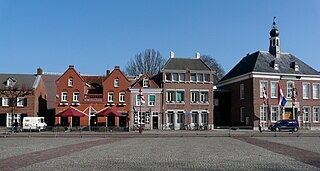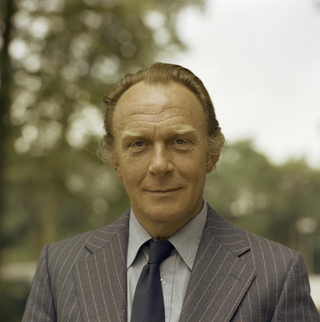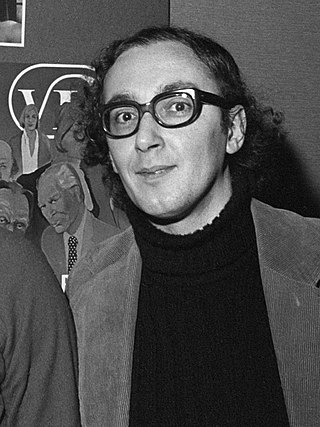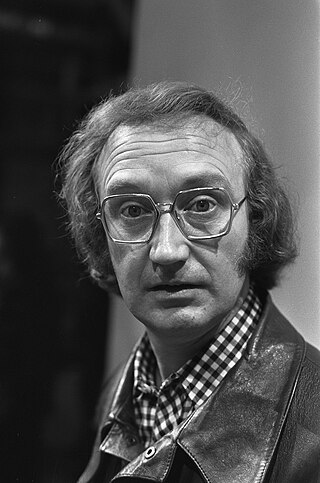
Ernst Wilhelm "Wim" Wenders is a German filmmaker and author, who is a major figure in New German Cinema. Among the honors he has received are prizes from the Cannes, Venice, and Berlin film festivals. He has also received a BAFTA Award and been nominated for three Academy Awards and a Grammy Award.

Shocking Blue was a Dutch rock band formed in The Hague in 1967. They were part of the Nederbeat movement in the Netherlands. The band had a string of hit songs during the counterculture movement of the 1960s and early 1970s, including "Send Me a Postcard" and "Venus", which became their biggest hit and reached number one on the U.S. Billboard Hot 100 and many other countries during 1969 and 1970. The band sold 13 million records by 1973 but disbanded in 1974. Together with Golden Earring, they are considered the most successful Nederbeat band, because they had their best hits charted abroad and especially in the United States.

Gemert-Bakel is a municipality in southern Netherlands.
Blue movie or Blue film may refer to:

Jan Willem Lincoln van de Wetering was the author of a number of works in English and Dutch.

Johannes Franciscus "Jos" Verstappen is a Dutch former racing driver, who competed in Formula One between 1994 and 2003.

Cinema of the Netherlands refers to the film industry based in the Netherlands. Because the Dutch film industry is relatively small, and there is little or no international market for Dutch films, almost all films rely on state funding. This funding can be achieved through several sources, for instance through the Netherlands Film Fund or the public broadcast networks. In recent years the Dutch Government has established several tax shelters for private investments in Dutch films.

Robert Piet Houwer is a Dutch film producer. He studied at the University of Television and Film Munich, Germany. In 1964 he directed the short film Anmeldung (Declaration) which was awarded a Silver Bear at the Berlin Filmfest. During the 1960s, Rob Houwer became one of the most prolific producers in Germany, with directors Volker Schlöndorff, Peter Fleischmann, Johannes Schaaf (Tattoo), Michael Verhoeven and Hans-Jürgen Syberberg.
This article lists some of the events that took place in the Netherlands in 2008.
Van Amersfoort Racing is an auto racing team based in the Netherlands. The team currently competes in the Formula 2 Championship, the Formula 3 Championship, the Formula Regional European Championship, and the Italian F4 Championship.

Bernhard Droog was a Dutch actor who appeared in 17 films, including the 1997 Academy Award-winning Character, and numerous television and theatre roles. Droog was a recipient of the Order of Orange-Nassau in 1970.

Nikolai van der Heyde was a Dutch film director and screenwriter.

Kees Brusse was a Dutch actor, film director and screenwriter. A self-taught actor, he was remarkable for his natural acting style at a time when more theatrical performances were the norm in The Netherlands. One of the first Dutch actors who managed to combine a stage and film career with a career on TV, radio and in commercials, he appeared in 47 films and television shows between 1936 and 2004, including Pension Hommeles (1957-1959), Ciske de Rat (1955), and Dokter Pulder zaait papavers (1975).

Pipo de Clown is a character created by writer and artist Wim Meuldijk, which became famous as the lead character of a popular early Dutch television series also written by Meuldijk, and which was subsequently popularized in movies and on records. The best-known of Pipo-actors was Amsterdam actor Cor Witschge, who played the part in the television series from 1958 to 1968 and from 1974 to 1980. The regular Pipo cast often performed in theaters and for company occasions. Pipo returned to the mainstream in the 2003 movie Pipo en de p-p-Parelridder, and in the 2009-2010 theater season with the musical Pipo en de Gestolen Stem.

Wim Verstappen was a Dutch film director and producer, television director, and screenwriter.

Pim de la Parra was a Surinamese-Dutch film director.

IJf Blokker is a Dutch musician and television actor and presenter. After a professional career as a drummer, he became a well-known television actor in the 1970s playing the character Barend Servet in the Wim T. Schippers-directed shows on VPRO television.

De Fred Haché Show is a 1971 Dutch television show written and directed for the VPRO by Wim T. Schippers, Ruud van Hemert, Wim van der Linden, and Gied Jaspars. The show marked the return to television for Schippers, van der Linden, and Jaspars, who had been on the team that was responsible for the controversial 1967 show Hoepla, canceled after three episodes. Like its "sister show" Barend is weer bezig (1972–1973) and Van Oekel's Discohoek, it was an absurdist show with much nudity, linguistic humor, satirical skits, and illogical plot lines.

Wim van der Linden was a Dutch photographer and film and television director. As a photographer he documented slums and subcultures in Amsterdam in the 1960s. His "Tulips", one of four experimental and satirical Sad Movies (1966-1967), is praised as one of the dramatic high points of Dutch film history, and with Wim T. Schippers and others he made groundbreaking and controversial television shows for the VPRO in the 1960s to the 1970s.
Eric Verstappen is a Dutch footballer who plays as a goalkeeper for German club Hoffenheim II in Regionalliga Südwest.
















